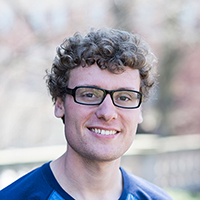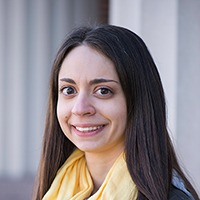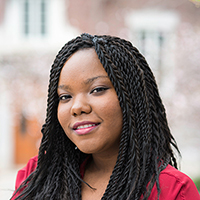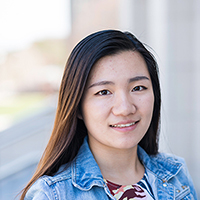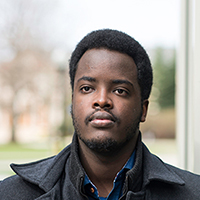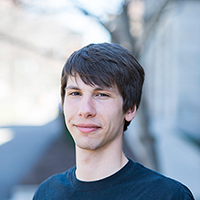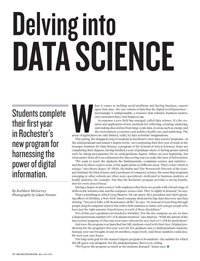Features
When it comes to tackling social problems and fueling business, experts agree that data—the vast volume of data that the digital world generates—increasingly is indispensable, a resource that scholars, business leaders, and consumers have only begun to tap.
In response a new field has emerged, called data science. It’s the creation and application of new methods for collecting, curating, analyzing, and making discoveries from large-scale data, in areas such as energy and the environment, economics and politics, health care, and marketing. The areas of application are only limited, really, by data scientists’ imaginations.
This spring, the inaugural crop of students in Rochester’s new data science programs—at the undergraduate and master’s degree levels—are completing their first year of study at the Goergen Institute for Data Science, a program of the Schools of Arts & Sciences. Some are completing their degrees, having finished a year of graduate study or having gotten started early by taking prerequisites for an undergraduate degree. Others are just beginning. But what unites them all is an enthusiasm for discovering ways to make the most of information.
“We want to teach the students the fundamentals—computer science and statistics—and then let them explore some of the applications in different areas. That’s what I think is unique,” says Henry Kautz ’87 (PhD), the Robin and Tim Wentworth Director of the Goergen Institute for Data Science and a professor of computer science. He notes that programs emerging at other schools are often more specialized—dedicated to business analytics or health analytics, for example—but that the Rochester program provides a strong foundation for every area of focus.
Having a degree in data science “tells employers that these are people with a broad range of skills on the statistics side and the computer science side. They’re highly in demand,” he says.
That’s something to which Greg Munves ’04 can attest. He’s president and chief operating officer of 1010data, a New York–based company dedicated to big-data discovery and data sharing. “You need folks with Renaissance skills,” he says. “So instead of searching through people deep in computer science but with a little statistics or math, now you get people who have just the right amount of proficiency in each of those disciplines.”
Two of this year’s graduates are headed to 1010data. “For the size company we are, we have a disproportionate number of U of R alumni involved,” says Munves. “With the advent of the data science program, it’s become even more relevant for us to look to U of R for good talent.”
And once the program was launched last fall, students voted with their feet. Original predictions for the program’s first year were for five graduate and 12 undergraduate students. Instead, year one brought 26 and 30 enrollees, respectively. And those numbers could double next year, says Kautz.
The long-term goal for the master’s degree program is 50 students—the number for which the lab space was designed. For the undergraduates, there is no ceiling.
“We’ll grow the program as much as the students demand,” Kautz says.

